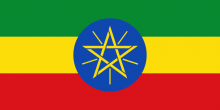Just ten days before Ethiopia’s human rights record is reviewed at the United Nations, the authorities should immediately release six bloggers and two journalists arrested on Friday and Saturday, the East and Horn of Africa Human Rights Defenders Project (EHAHRDP) said today.
Befeqadu Hailu, Atnaf Berahane, Mahlet Fantahun, Zelalem Kiberet, Natnael Feleke and Abel Wabela, all bloggers and activists at Zone9, were arrested along with journalist Tesfalem Waldyes late afternoon on Friday 25th April 2014. Freelance journalist and friend of Zone9 Edom Kasaye was arrested on Saturday morning, 26th April. They are being held at the Maekelawi Detention Centre in Addis Ababa. Zone9 reports that police removed laptops, newspapers and books during a search of their homes, and that they have been denied access to family members.
An independent and well-respected blog, Zone9 describes itself as “an informal group of young Ethiopian bloggers working together to create an alternative independent narration of the socio-political conditions in Ethiopia.” After seven months of inactivity due to harassment by government security agents, the bloggers had announced their return to activism on 23rd April 2014, just two days before the arrest.
EHAHRDP urges the Ethiopian authorities to immediately release the six Zone 9 bloggers and two journalists. Serious human rights abuses, unlawful interrogation tactics, and poor detention conditions in Maekelawi were reported by Human Rights Watch in October 2013. EHAHRDP further calls on the Ethiopian authorities to ensure that the detainees’ rights are respected, and in particular to allow access to family members and lawyers.
The arrests are part of a broader, ongoing crackdown on freedom of expression in Ethiopia. A number of journalists and human rights defenders who have exposed human rights violations or discussed sensitive issues have been arrested and detained under vague provisions in the 2009 Anti-Terrorism Proclamation. The legislation has had a chilling effect on the work of independent media in the country. In 2012, journalist Eskinder Nega was convicted on terrorism charges and sentenced to 18 years in prison after writing an article criticizing the government’s use of the legislation to persecute those who express dissenting views.
Ethiopia’s human rights record will examined under the Universal Periodic Review mechanism at the UN Human Rights Council on Tuesday 6th May. EHAHRDP calls on participating States to use this opportunity to hold Ethiopia to account by asking questions about the detained journalists, bloggers and human rights defenders, and making strong recommendations for the protection of freedom of expression and the work of civil society in the country.
For more information, please contact:
Mr Hassan Shire, Executive Director on [email protected] or +256 772 753 753
Ms Rachel Nicholson, Advocacy and Research Manager on [email protected] or +256 778 921 274

